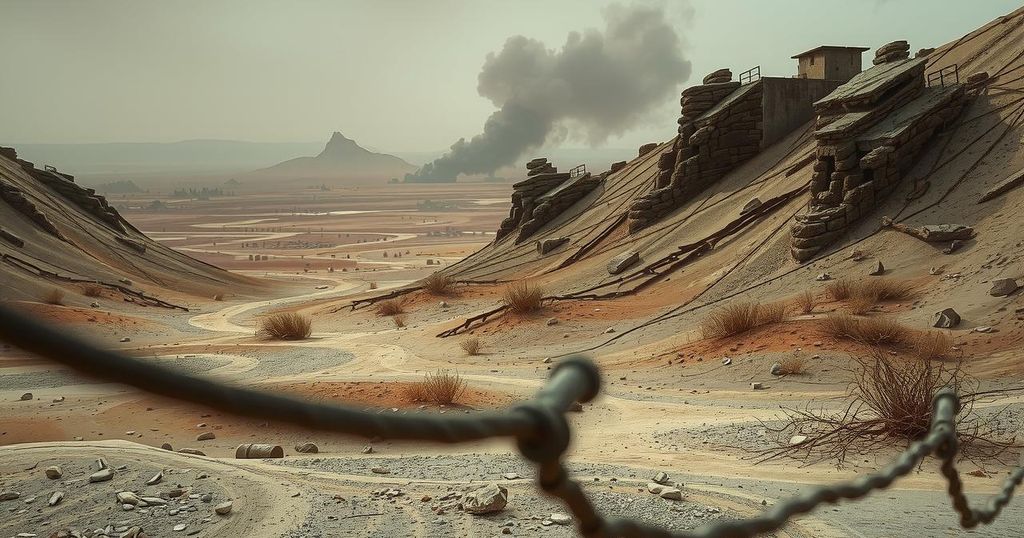Professor Jok Madut Jok warns that South Sudan’s peace deal is collapsing, risking a return to civil war as tensions escalate between political leaders. He highlights the dire humanitarian situation, increasing communal conflicts, economic challenges, and the need for accountability among leaders. Urging the South Sudanese to unify, he states that the future depends critically on the imminent choices made by the government and citizens alike.
Professor Jok Madut Jok, a notable South Sudanese political analyst and anthropology professor at Syracuse University, has indicated that South Sudan is on the brink of a renewed civil war as the 2018 peace agreement begins to unravel. During a discussion with Radio Tamazuj, he expressed grave concerns regarding the rising tensions between President Salva Kiir and First Vice President Riek Machar. The opposition SPLM/A-IO is now faced with a critical decision to either accept the prevailing political reality or return to armed conflict.
“The peace agreement is collapsing,” stated Professor Jok, cautioning that the SPLA-IO must choose between conceding their pride or re-engaging in warfare. He emphasized the dire implications of this decision for the nation. Furthermore, he assessed Dr. Machar’s situation as precarious, mentioning that he is effectively under house arrest and that his political and military leadership is in confusion. With many commanders in hiding and positions secured by the SPLM-IG, Professor Jok highlighted the diminishing commitment to the peace agreement by President Kiir.
Should the current situation persist, Prof. Jok forewarned that the agreement will fail completely. He remarked that the SPLM-IG could consolidate power, leading to a choice for the opposition between submission or rebellion, as the stability of the peace deal becomes increasingly uncertain.
The professor also noted a troubling increase in communal conflicts, viewing them as symptomatic of political power struggles within the capital, Juba. He remarked, “Conflicts are increasing and becoming more lethal,” citing the rising tensions between various ethnic groups. While recognizing the Revitalized Agreement on the Resolution of the Conflict in South Sudan (R-ARCSS), he argued it inadequately addresses the underlying issues fueling violence across the nation.
Addressing the humanitarian situation, Professor Jok lamented the dire economic conditions facing South Sudan, characterized by failed harvests, collapsing markets, and interrupted trade due to regional conflicts. He expressed acute concern that a return to widespread conflict would severely exacerbate these challenges, as political leaders seem primarily occupied with preserving their power rather than attending to national crises.
Adding to his concerns, he criticized the deployment of Ugandan People’s Defence Forces (UPDF) in South Sudan, labeling it as an affront to South Sudanese citizens. He warned that their involvement primarily benefits those in power, and conflict is likely to intensify if they confront the White Army. Moreover, he expressed frustration with the government’s unequal prioritization, highlighting how foreign troops are compensated while local soldiers remain unpaid for extended periods. This creates discontent and jeopardizes national unity.
Advocating for accountability, Professor Jok encouraged South Sudanese citizens to unite in holding their leaders accountable and to champion human rights. He expressed concern that the international community may pull back if the government resorts to undemocratic consolidation of power. As the nation faces significant decisions ahead, he underscored the urgency of establishing transitional leadership to ensure the country’s survival.
In concluding, Professor Jok reiterated that the choices made in the months to come will fundamentally shape South Sudan’s trajectory, determining whether it descends into chaos or charts a course toward enduring peace.
Professor Jok Madut Jok emphasizes that South Sudan stands at a pivotal moment due to the disintegrating 2018 peace agreement, escalating political tensions, and severe humanitarian crises. Leaders must prioritize accountability and unity among citizens to steer the nation away from impending chaos. Conscious choices made now will greatly influence South Sudan’s future and either pave the way for peace or lead to renewed conflict.
Original Source: www.radiotamazuj.org




